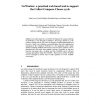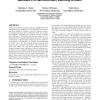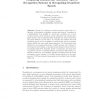13457 search results - page 102 / 2692 » Can we elect if we cannot compare |
AMTA
1998
Springer
14 years 1 months ago
1998
Springer
Cross-language retrieval systems use queries in one natural language to guide retrieval of documents that might be written in another. Acquisition and representation of translation...
APCHI
2004
IEEE
14 years 22 days ago
2004
IEEE
An earlier paper has covered the development of a paper prototype of NetWorker, a tool designed to facilitate a Web usage referred to as the Collect-Compare-Choose cycle. Here we d...
GECCO
2006
Springer
14 years 20 days ago
2006
Springer
Both genetic algorithms (GAs) and temporal difference (TD) methods have proven effective at solving reinforcement learning (RL) problems. However, since few rigorous empirical com...
TNN
1998
13 years 8 months ago
1998
—Adaptive resonance theory (ART) describes a family of self-organizing neural networks, capable of clustering arbitrary sequences of input patterns into stable recognition codes....
AI
2011
Springer
13 years 19 days ago
2011
Springer
Abstract. Speech is a complex process that requires control and coordination of articulation, breathing, voicing, and prosody. Dysarthria is a manifestation of an inability to cont...



